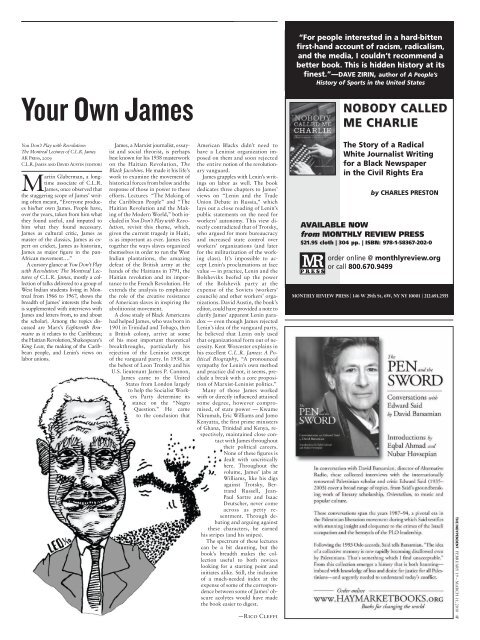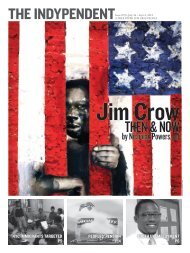Download Issue (pdf) - The Indypendent
Download Issue (pdf) - The Indypendent
Download Issue (pdf) - The Indypendent
You also want an ePaper? Increase the reach of your titles
YUMPU automatically turns print PDFs into web optimized ePapers that Google loves.
indy ad charlie.qxd 2/12/2010 9:55 AM Page 1<br />
indy ad charlie.qxd 2/12/2010 9:55 AM Page 1<br />
indy ad charlie.qxd 2/12/2010 9:55 AM Page 1<br />
Your Own James<br />
You Don’t Play with Revolution:<br />
<strong>The</strong> Montreal Lectures of C.L.R. James<br />
AK Press, 2009<br />
C.L.R. James and David Austin (editor)<br />
Martin Glaberman, a longtime<br />
associate of C.L.R.<br />
James, once observed that<br />
the staggering scope of James’ writing<br />
often meant, “Everyone produces<br />
his/her own James. People have,<br />
over the years, taken from him what<br />
they found useful, and imputed to<br />
him what they found necessary.<br />
James as cultural critic, James as<br />
master of the classics, James as expert<br />
on cricket, James as historian,<br />
James as major figure in the pan-<br />
African movement….”<br />
A cursory glance at You Don’t Play<br />
with Revolution: <strong>The</strong> Montreal Lectures<br />
of C.L.R. James, mostly a collection<br />
of talks delivered to a group of<br />
West Indian students living in Montreal<br />
from 1966 to 1967, shows the<br />
breadth of James’ interests (the book<br />
is supplemented with interviews with<br />
James and letters from, to and about<br />
the scholar). Among the topics discussed<br />
are Marx’s Eighteenth Brumaire<br />
as it relates to the Caribbean;<br />
the Haitian Revolution, Shakespeare’s<br />
King Lear, the making of the Caribbean<br />
people, and Lenin’s views on<br />
labor unions.<br />
James, a Marxist journalist, essayist<br />
and social theorist, is perhaps<br />
best known for his 1938 masterwork<br />
on the Haitian Revolution, <strong>The</strong><br />
Black Jacobins. He made it his life’s<br />
work to examine the movement of<br />
historical forces from below and the<br />
response of those in power to these<br />
efforts. Lectures “<strong>The</strong> Making of<br />
the Caribbean People” and “<strong>The</strong><br />
Haitian Revolution and the Making<br />
of the Modern World,” both included<br />
in You Don’t Play with Revolution,<br />
revisit this theme, which,<br />
given the current tragedy in Haiti,<br />
is as important as ever. James ties<br />
together the ways slaves organized<br />
themselves in order to run the West<br />
Indian plantations, the amazing<br />
defeat of the British army at the<br />
hands of the Haitians in 1791, the<br />
Haitian revolution and its importance<br />
to the French Revolution. He<br />
extends the analysis to emphasize<br />
the role of the creative resistance<br />
of American slaves in inspiring the<br />
abolitionist movement.<br />
A close study of Black Americans<br />
had helped James, who was born in<br />
1901 in Trinidad and Tobago, then<br />
a British colony, arrive at some<br />
of his most important theoretical<br />
breakthroughs, particularly his<br />
rejection of the Leninist concept<br />
of the vanguard party. In 1938, at<br />
the behest of Leon Trotsky and his<br />
U.S. lieutenant James P. Cannon,<br />
James came to the United<br />
States from London largely<br />
to help the Socialist Workers<br />
Party determine its<br />
stance on the “Negro<br />
Question.” He came<br />
to the conclusion that<br />
American Blacks didn’t need to<br />
have a Leninist organization imposed<br />
on them and soon rejected<br />
the entire notion of the revolutionary<br />
vanguard.<br />
James grapples with Lenin’s writings<br />
on labor as well. <strong>The</strong> book<br />
dedicates three chapters to James’<br />
views on “Lenin and the Trade<br />
Union Debate in Russia,” which<br />
lays out a close reading of Lenin’s<br />
public statements on the need for<br />
workers’ autonomy. This view directly<br />
contradicted that of Trotsky,<br />
who argued for more bureaucracy<br />
and increased state control over<br />
workers’ organizations (and later<br />
for the militarization of the working<br />
class). It’s impossible to accept<br />
Lenin’s proclamations at face<br />
value — in practice, Lenin and the<br />
Bolsheviks beefed up the power<br />
of the Bolshevik party at the<br />
expense of the Soviets (workers’<br />
councils) and other workers’ organizations.<br />
David Austin, the book’s<br />
editor, could have provided a note to<br />
clarify James’ apparent Lenin paradox<br />
— even though James rejected<br />
Lenin’s idea of the vanguard party,<br />
he believed that Lenin only used<br />
that organizational form out of necessity.<br />
Kent Worcester explains in<br />
his excellent C.L.R. James: A Political<br />
Biography, “A pronounced<br />
sympathy for Lenin’s own method<br />
and practice did not, it seems, preclude<br />
a break with a core proposition<br />
of Marxist-Leninist politics.”<br />
Many of those James worked<br />
with or directly influenced attained<br />
some degree, however compromised,<br />
of state power — Kwame<br />
Nkrumah, Eric Williams and Jomo<br />
Kenyatta, the first prime ministers<br />
of Ghana, Trinidad and Kenya, respectively,<br />
maintained close contact<br />
with James throughout<br />
their political careers.<br />
None of these figures is<br />
dealt with uncritically<br />
here. Throughout the<br />
volume, James’ jabs at<br />
Williams, like his digs<br />
against Trotsky, Bertrand<br />
Russell, Jean-<br />
Paul Sartre and Isaac<br />
Deutscher, never come<br />
across as petty resentment.<br />
Through debating<br />
and arguing against<br />
these characters, he earned<br />
his stripes (and his snipes).<br />
<strong>The</strong> spectrum of these lectures<br />
can be a bit daunting, but the<br />
book’s breadth makes the collection<br />
useful to both novices<br />
looking for a starting point and<br />
initiates alike. Still, the inclusion<br />
of a much-needed index at the<br />
expense of some of the correspondence<br />
between some of James’ obscure<br />
acolytes would have made<br />
the book easier to digest.<br />
—Rico Cleffi<br />
“For people interested in hard-bitten<br />
first-hand<br />
“For people account<br />
interested of racism,<br />
in a hard-bitten<br />
radicalism,<br />
first-hand “For people<br />
and the media,<br />
account interested couldn’t<br />
of racism, in a hard-bitten<br />
recommend<br />
radicalism,<br />
first-hand better the book.<br />
media, account<br />
This<br />
I couldn’t of racism,<br />
is hidden<br />
recommend radicalism,<br />
history at its<br />
a<br />
better and the<br />
finest.”—DAVE book. media, This I couldn’t<br />
ZIRIN, is hidden recommend history<br />
author at<br />
of A People’s<br />
its<br />
a<br />
better finest.”—DAVE book. This<br />
History of Sports ZIRIN, is hidden<br />
in the author history<br />
United of States A People’s<br />
at its<br />
finest.”—DAVE ZIRIN, author of A People’s<br />
History of Sports in the United States<br />
History of Sports in the United States<br />
NOBODY CALLED<br />
NOBODY CALLED<br />
ME NOBODY CHARLIE<br />
CALLED<br />
ME CHARLIE<br />
ME CHARLIE<br />
<strong>The</strong> Story of a Radical<br />
White <strong>The</strong> Story Journalist of a Radical<br />
Writing<br />
for White <strong>The</strong> Story<br />
a Black Journalist of a Radical<br />
Newspaper Writing<br />
in for White<br />
the Black Journalist<br />
Civil Newspaper<br />
Writing<br />
Rights Era<br />
in for<br />
the a Black<br />
Civil Newspaper<br />
Rights Era<br />
in the Civil Rights Era<br />
by CHARLES PRESTON<br />
by CHARLES PRESTON<br />
by CHARLES PRESTON<br />
AVAILABLE NOW<br />
AVAILABLE from MONTHLY NOW<br />
AVAILABLE NOW<br />
REVIEW PRESS<br />
from MONTHLY REVIEW PRESS<br />
from MONTHLY REVIEW PRESS<br />
$21.95 cloth | 304 pp. | ISBN: 978-1-58367-202-0<br />
$21.95 cloth | 304 pp. | ISBN: 978-1-58367-202-0<br />
$21.95 cloth | 304 pp. | ISBN: 978-1-58367-202-0<br />
order online @ monthlyreview.org<br />
order call online 800.670.9499<br />
monthlyreview.org<br />
order online @ monthlyreview.org<br />
or call 800.670.9499<br />
or call 800.670.9499<br />
MONTHLY REVIEW PRESS | 146 W 29th St, 6W, NY NY 10001 | 212.691.2555<br />
MONTHLY REVIEW PRESS | 146 W 29th St, 6W, NY NY 10001 | 212.691.2555<br />
MONTHLY REVIEW PRESS | 146 W 29th St, 6W, NY NY 10001 | 212.691.2555<br />
<strong>The</strong> <strong>Indypendent</strong> February 19 – March 11, 2010 17












